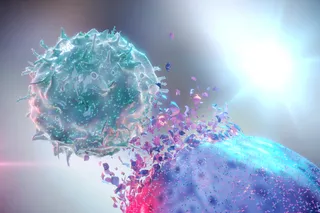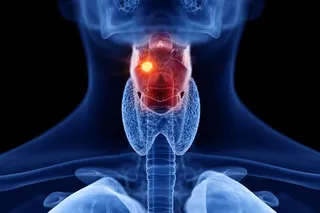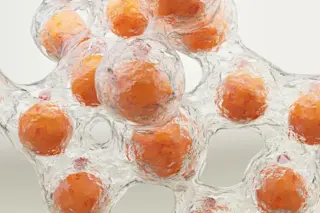Fresh veggies and a healthy lifestyle are striking a blow against "genetic destiny." When a handful of patients with early-stage prostate cancer made dramatic changes to their lifestyles, switching broccoli for red meat and exercising diligently, they made equally dramatic changes to the behavior of their genes. In a new study, researchers took biopsies before and after the three-month experiment in healthy living, and found that the patients' lifestyle changes had switched on or off over 500 genes.
Some of the changes positively affect genes that help fight cancer, while others help turn off genes that promote cancer development [HealthDay News].
Dean Ornish, the lead researcher, is a clinical professor of medicine at [University of California, San Francisco] and also a diet guru who's been telling us for years that by improving our lifestyle we can prevent and even reverse many chronic diseases. And Ornish has been putting his money where his mouth is, backing a number of scientific studies that support his arguments
[WebMD].
For this study, Ornish found test subjects who had been diagnosed with early-stage prostate cancer and had decided to adopt a "watchful waiting" approach instead of trying surgery and radiation treatment. Under Ornish's careful eye, they embarked on dramatic lifestyle changes. They were provided with a low-fat vegan diet, with lots of fresh fruit, vegetables, whole grains, and soy products; they also exercised daily, and did yoga and meditation exercises. Researchers were astonished that after only three months, the biopsies already showed changes in the functioning of hundreds of genes. The findings, published in the Proceedings of the National Academy of Sciences, come from a small pilot study that followed only 30 men, so researchers caution against making sweeping generalizations. But the results are compelling enough to get people thinking, Ornish writes:
Often, I hear people say, "Oh, I've got bad genes, there's nothing I can do about it"--displaying what I call genetic nihilism. Our findings (the first to show the effect of lifestyle changes on any kind of cancer genes) can be an antidote to genetic nihilism and, I hope, motivate people to begin making their own changes [Newsweek].
Researchers say the study was far too short to determine whether the lifestyle changes kept the cancer cells from spreading, and say they hope to do long-range studies soon. But they say the study indicates that exercising, improving nutrition and limiting stress may prompt "profound" differences in the behavior of genes. Among them: some genes believed to be tumor suppressors turned on or became more active, whereas certain disease-promoting ones, including oncogenes (in the so-called RAS family that are implicated in both prostate and breast cancer), were down-regulated or switched off [Scientific American].
Image: flickr/karimian














